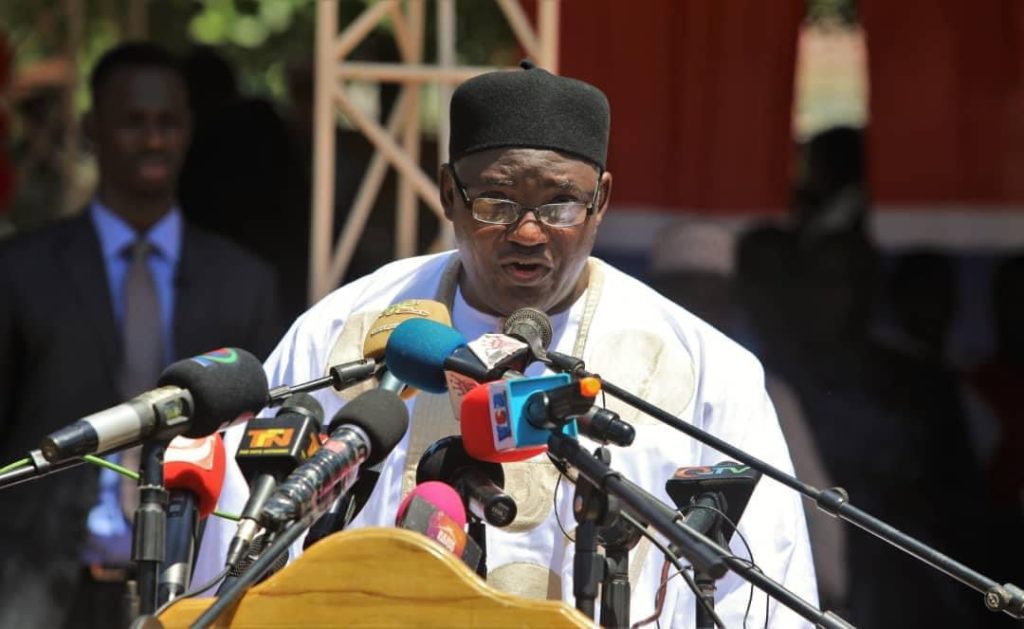
President Adama Barrow speaking at the inauguration of accessible smart farming
By Landing Ceesay
The President of the Republic of the Gambia, Adama Barrow, stated that he believes the inauguration of accessible smart farming will reduce the country’s youth unemployment.
President Adama Barrow inaugurated a joint project on smart farming between the National Food Security Processing and Marketing Cooperation and Tijms International BV of the Netherlands on Friday. The project aims to increase yields and outputs, improve food production, enhance the resilience of communities to climate, sanitary, and technical challenges, increase household income, and improve food security.
Smart farming is a way of managing farms using modern information and communication technologies to increase the quantity and quality of products while optimizing the human labor required.
The project will cultivate various crops, including tomatoes, onions, maize, rice, groundnuts, beans, and upland rice, at various sites across the country. It is also expected to increase export earnings and boost food security in the Gambia.
Speaking at the inauguration of the project, President Barrow called for food security in the country and highlighted the importance of digital technology and inclusiveness in the project.
“In this direction, the inauguration of this project attests to my government’s recent policy shifts, brought about by global circumstances. Now, in the interest of the people, our focus is on bold solutions, using digital technologies in the agriculture sector. Heads of public institutions have to see this as an example of forward-thinking approaches and innovative development.
“Thus, our partnerships ought to be mutually beneficial and aligned with the realities of the people. In the same way, our projects should always be inclusive and multi-faceted enough to effectively solve the growing challenges of our growing youthful population. My belief is that the success of this project will surely lead to a decrease in youth unemployment. It is a bold step towards food self-sufficiency and will contribute to increased GDP and foreign exchange earnings,” Barrow said.
President Adama Barrow urged public servants to devise bold solutions to safeguard the country’s integrity and independence, emphasizing the importance of attaining and sustaining food sovereignty.
The president went on to say that governments and organizations around the world are now evolving in structure and operation based on lessons learned from the COVID-19 pandemic. He stressed the need for the Gambia to do the same in order to build a more resilient and sustainable future.
“This evolution is absolutely necessary in our countries as our populations and their demands change and grow. It is on account of the dynamics of change and growth that governance, services, and production can no longer be the same. This means that the practices and procedures in all formal institutions must change,” he said.
President Barrow thanked the National Food Security Processing and Marketing Cooperation (NFSPMC) for securing a significant project for the country. He said the developments at NFSPMC are a testament to what can be achieved with robust and strategic management, supported by visionary government leadership. Barrow believes that developing the country’s sectors requires combined institutional efforts focused on meeting the people’s expectations.
“I look forward to the successful implementation of the project because I know it will provide the necessary blueprint for the attainment of food sovereignty. I also applaud TIJMS Trading International for their partnership. My government will give all the support it can muster to ensure that this initiative succeeds in benefiting the parties involved.
“It is convincing that, with unity and such support, The Gambia would eventually become a beacon of hope and glory. We can demonstrate how a nation can achieve great things when a people stand together under one unified vision: unified in purpose, unified in strength, and unified in development,” Barrow said.
The project aims to make the Gambia the center for assembling tractors and other smart agricultural machinery, which will make smart farming more accessible to Gambian farmers. Smart farming is a combination of technologies that use solar power, GPS, remote control, and mechanization to improve soil quality, reduce the use of chemical fertilizers, and store solar power. The project will also provide maintenance and repair services, as well as technical assistance to Gambian farmers.
